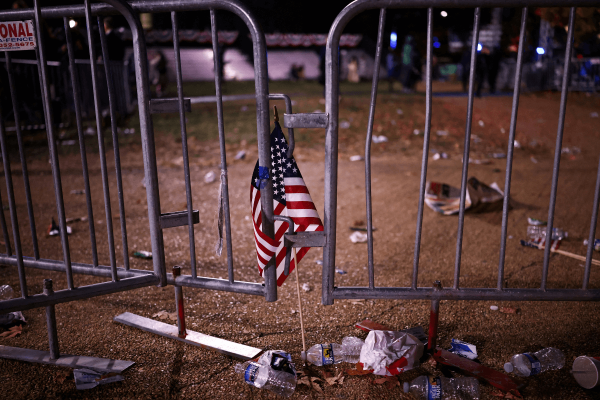I spent most of Election Day visiting polling sites across Philadelphia. Together with Rev. Alyn Waller, who helped lead Faiths United to Save Democracy’s nonpartisan, multifaith voter protection work in Pennsylvania, I tried to encourage and support the poll chaplains and other peacemakers who provided a moral presence at vulnerable polling sites. It was tiring but uplifting work. The mood at these polling sites was often joyous, with DJs spinning music and volunteers celebrating as voters entered and exited the buildings. Though there was evidence of foreign misinformation and bomb threats in several states, experts do not believe these interruptions kept anyone from voting.
As the polls closed, I felt mostly grateful: Despite real concerns about potential widespread voter intimidation or political violence, most voters experienced a safe and fair process of casting their ballot. But as the results of the election began rolling in, I felt deep unease. After a restless sleep, I felt a noxious pit in my stomach when I woke up in the early morning and learned that former President Donald Trump had been elected to a second term.
The news was soul-wrenching. My mind raced to those who would be most impacted by the policies Trump has proposed: the undocumented immigrants he has promised to deport in unprecedented numbers, the LGBTQ+ folks whose civil liberties could be restricted, the refugees who will be affected by a renewed travel ban, people of other faiths who will wonder if religious freedom in the U.S. is only for Christians, women and others who will likely see further attacks on their reproductive freedom, and the political enemies upon whom Trump has said he would exact revenge.
Knowing all this, I’ll admit I struggle to face the reality that many in our country — roughly 51 percent of the popular vote, according to current estimates — are feeling some combination of elation, pride, and excitement that their chosen candidate has won. Even in my pain and grief, I know that as a follower of Jesus, I am called to pray for the incoming Trump administration and the people who voted for it. I’m committed to doing that work, but I confess: It feels hard right now.
In the days to come, it’s imperative that we see the rest of our election process through to ensure that every vote is accurately and fairly counted. Even though the presidential race has been called, many races up and down the ballot are still too close to know the outcome, including congressional races that will determine which party controls the House of Representatives.
And in weeks ahead, we’ll have time to grapple with the question that has haunted us in various forms since Trump’s first election in 2016: Why wasn’t Trump’s fearmongering, race-baiting, and increasingly fascist rhetoric disqualifying for more voters, especially Christians? And I’m sure we’ll delve into the extent to which racial and gender bias, disinformation, campaign funding, and new voting restrictions — especially those aimed at discouraging voting among Black and brown communities — factored into these election results. These and other important questions need greater examination.
But right now, here’s what I think matters most:
We need to remind ourselves that it is both okay and necessary to feel in this moment. Whether those feelings include despair, shock, anger, trepidation, resolve, numbness, or something else, surrendering our most raw and vulnerable feelings to God is an act of faith. There are many scriptures that we can turn to for comfort and strength that remind us of God’s sovereignty and faithfulness. I’ve been reflecting on Philippians 4:6-8: “Do not be anxious about anything, but in every situation, by prayer and petition, with thanksgiving, present your requests to God. And the peace of God, which transcends all understanding, will guard your hearts and your minds in Christ Jesus.” Petitions aren’t simply requests; they can be heartfelt pleas or even anguished cries. Allowing ourselves to go through a real process of lament helps to make room for God’s peace that surpasses all understanding — which, in turn, can become an even greater resolve to resume the struggle for justice and peace.
There is a lot of work ahead and I’ve felt tempted to just pour myself into all that will be required of us in months to come, including by planning how we can best resist whatever harmful policies and actions that a new Trump administration attempts. If you’ve felt the same, I challenge you to rest before you reset. This is the time to lean first and foremost into our faith and not our politics. For me, this meant that after learning Trump had won, my family — me, my wife, and our two sons — spent time together as we processed our own feelings in this moment, including how we would continue to care for each other and our extended family and friends. I encourage you to do the same with your families, churches, friends, or neighbors. Caring for ourselves, our loved ones, and those who are most vulnerable in this moment is our calling card as followers of Jesus.
In his victory speech, Trump promised that “we’re going to help our country heal” and that he would fight for “every citizen.”
I hope and pray that he meant those words and not the alarming rhetoric and vision of the future he cast throughout his campaign. But we must also be prepared for the very real scenario that Trump meant what he said when he promised to go after the “enemies from within” or to conduct mass deportations — and that many Americans want him to carry out these commitments, even if that means undermining or destroying our democratic norms and system.
But for right now, amid processing this news, I’m sharing some lyrics from “Its OK,” a song by Maverick City Music that always brings me solace:
And it’s okay / To not be okay / I won’t try to hide / ’Cause love leaves room for me to say / That I’m not okay
Got something to say about what you're reading? We value your feedback!







